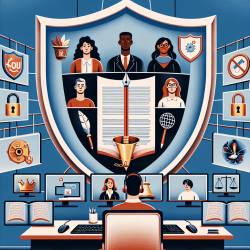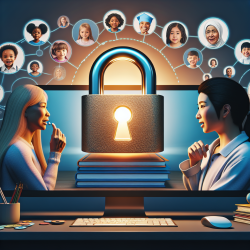The digital revolution has transformed education, offering unprecedented opportunities for online learning. However, it also presents unique challenges for educators striving to maintain control over their content and teaching methods. The research article "The Right to Teach in a Hyper-Digital Age: Legal Protections for (Post-)Pandemic Concerns" by Mathieu Deflem provides invaluable insights into safeguarding educators' rights in this new landscape.
Understanding the Challenges
The COVID-19 pandemic accelerated the shift to virtual instruction, raising concerns about unauthorized recording and distribution of lectures. This shift has exposed educators to potential breaches of copyright and academic freedom. The research highlights several legal avenues available to protect educators' rights:
- Copyright Law: Educators have the right to copyright their lectures and teaching materials. This protection extends to both physical and virtual settings.
- Academic Freedom: The principle of academic freedom safeguards educators' rights to teach freely without fear of censorship or unauthorized dissemination of their work.
- Breach of Confidence: This principle emphasizes the trust-based relationship between educators and students, protecting against unauthorized sharing of educational content.
Implementing Legal Protections
Educators can take proactive steps to implement these legal protections in their practice:
- Understand Your Rights: Familiarize yourself with copyright laws and academic freedom principles relevant to your jurisdiction.
- Communicate Clearly: Include copyright notices and expectations regarding recording and sharing in your course syllabi.
- Develop Institutional Policies: Work with your institution to establish clear guidelines that protect both educators' and students' rights.
- Create a Culture of Trust: Foster an environment where students understand the importance of maintaining confidentiality and respect for intellectual property.
The Role of Institutions
Institutions play a crucial role in supporting educators by developing comprehensive policies that address these challenges. By collaborating with legal experts, institutions can create frameworks that uphold academic integrity while protecting educators' rights.
The Path Forward
The digital age offers exciting possibilities for education, but it also requires vigilance to protect educators' rights. By understanding and implementing legal protections, educators can confidently navigate this new landscape while maintaining control over their intellectual property.
For those interested in delving deeper into this topic, further research is encouraged. Understanding the legal landscape will empower educators to advocate for their rights effectively.
To read the original research paper, please follow this link: The Right to Teach in a Hyper-Digital Age: Legal Protections for (Post-)Pandemic Concerns.










